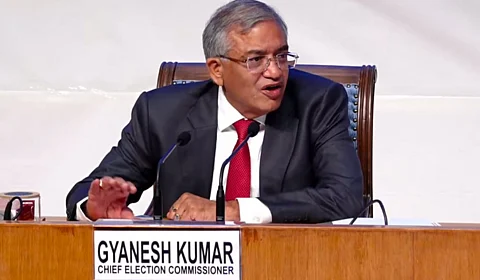

Follow TNM’s WhatsApp channel for news updates and story links.
The Election Commission of India (ECI) adopted a self-righteous tone on Sunday, August 17, dismissing "vote theft" allegations by Rahul Gandhi in its first press conference since Bihar's controversial Special Intensive Revision (SIR), stating that they are standing like a rock behind the Indian voter.
“Either give an affidavit under oath or apologise to the nation. If the affidavit is not received within 7 days, it means that all these allegations are baseless,” Chief Election Commissioner Gyanesh Kumar, said in response to allegations made by Rahul Gandhi. The CEC stated that the ECI takes every possible step to safeguard the voting rights of every citizen in the country, and a deliberate attempt is being made to discredit them.
The Commission’s press meet comes 10 days after the Opposition leader in a press conference accused the ECI of facilitating widespread electoral malpractice. Rahul alleged that over one lakh fake votes were registered to aid in BJP’s victory in Bengaluru Central Lok Sabha constituency in the 2024 Parliament elections.
Rahul Gandhi had also accused the body of attempting to steal Bihar’s Assembly elections. Following his press conference, the ECI had accused the Congress leader of using ‘dirty phrases’ against them.
Speaking to media on Sunday, August 16, Gyaneesh Kumar said that the ECI is not scared of such allegations which tantamount to insulting the Constitution. Using words like ‘vote chori’ to mislead voters is an insult to the Indian Constitution, he said. “The EC is not scared of such allegations and neither are the voters. I want to make it clear that the EC will without bias stand like a rock with women, poor, young, voters of the country,” he said.
On questions regarding allegations of undue haste in SIR, the ECI said they are misleading. "The law says that such revisions are to be done before the polls," the CEC said, adding that it wasn't the first time such revisions were being held in Bihar.
"In Bihar, in 2003 an SIR was done. It was done successfully then, it would be done successfully now," Gyanesh Kumar said.
When asked about voter irregularities in Kerala and Karnataka, the CEC said, “If no candidate had a problem even up till 45 days after the election concluded, then it is clear to all voters what the intent is.”
Gyanesh Kumar also said that unlike the special summary revision, the SIR is an attempt to purify the rolls by giving to each voter an enumeration form.
Responding to a question on why the ECI is determining eligibility, Gyanesh Kumar said that it was being done to ensure that the Article 326 of the Constitution is not violated.
When asked about Nepali and Bangladeshi voters, the CEC said that to prove the validity of a voter's participation when their nationality is in doubt, some documents have been asked. “The vetting process will continue till September 30,” he said.
When asked about non-availability of machine-readable electoral lists, the CEC said there is a difference between it and searchable electoral lists, which is a feature in their website. “The voter information on EC website can be searched using the EPIC number and downloaded. Even the Supreme Court said in 2019 that by publishing machine readable information, you compromise voter privacy,” the CEC said.